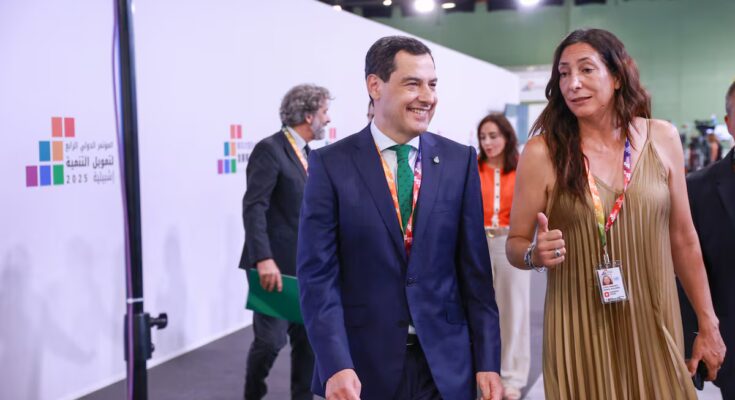2025 was the year with the largest budget allocated in history by the autonomous communities for development cooperation: 334.4 million euros, 8.7 million euros more than in 2024, according to the report Autonomous cooperationin which the Coordinator of Development Organizations of Spain analyzes the 2025 regional budgets in this context. But this growth, when considering each territory, has been very uneven, warn the authors of the report. While Catalonia and the Basque Country have increased the investments allocated in this chapter, Andalusia is the region that cuts the most, 13.54% in the last year, a cut that adds to “several continuous years of deep cuts”, is noted in the document presented this Friday to the Andalusian Parliament.
Andalusia is the autonomous community that has cut its budget in Public Development Assistance (ODA) the most in the last seven years – precisely the period of the PP governments in the Council -, both in relative terms, where the percentage went from 0.14% in 2018, to 0.04% in 2025 – in the last year alone the annual rate of change was -17.23% -; as in absolute values: the budget was reduced from 47.3 million euros in 2018 to 18.8 million in 2025, a decrease that attracts more attention if one takes into account that its regional accounts have only increased in this same period. “A question that reflects how the lack of funding for ODA is linked to a lack of political will and not to economic reasons,” the report concludes.
“In a context of wars, growing conflicts, inflation, where we are witnessing real international tragedies, the cut is increasingly alarming and goes against the mandate of the Statute of Autonomy which says that Andalusia is a people of solidarity. We are witnessing a gradual dismantling of development aid”, warns Patricia Sánchez, president of the Andalusian Coordinator of the ONGD, who this morning participated in the presentation of the report in the regional Parliament.
For Sánchez, this “setback” in investments in ODA has to do with a “matter of priorities of the Andalusian government”. This is the conclusion he reaches after having had meetings in recent years, first with the current Minister of Health, the Presidency and Emergencies, Antonio Sanz, on whom development aid depended until last year, when he became dependent on the Ministry of Social Inclusion, Youth, Family and Equality, with whose head, Loles López, they also met. “These are departments with many fronts, many powers, many social agents and the cooperation is there, but the budget does not increase,” says Sánchez.
After seven years of continuous cuts, the amount allocated for the 2026 budgets, the debate of which took place on Wednesday, remains frozen: 18.9 million. “This is a hidden cut because the item does not increase in proportion to the growth of the regional consolidated budget, which once again breaks records,” says Sánchez, referring to the 5.6% growth of regional accounts for next year, reaching a total of 51,597 million euros.
“We are quite frustrated,” summarizes the president of the Andalusian Coordinator of the ONGD, who recalls that this percentage growth is part of the general development cooperation plan just approved last July. Sánchez also draws attention to the fact that just this summer Seville also hosted the Fourth United Nations International Conference on Financing for Development. “There we heard many heads of state, and also the president of the Andalusian government, talk about the importance of development cooperation, which is why the fact that the amount was not increased this year is, to say the least, scandalous for us,” adds Sánchez.
The threat of the far right
Andalusia is also not doing well if we compare the investment data in the period in which most of the money for ODA was allocated, just before the great recession, and the current ones. While La Rioja, the Basque Country and Catalonia have exceeded pre-crisis figures, Andalusia is the region that has cut the most, 80.5 million compared to 2009, well above Castilla-La Mancha (42.4 million) or Madrid (34.1). The community led by Moreno is the third that allocates the least money for cooperation per inhabitant, 2.15 euros per person, ahead of Madrid and Murcia (0.68 euros respectively) and Castilla-La Mancha (1.87). The average in 2024 was 8.49 euros per person.
The report warns that, despite the general increase in the budget for cooperation and development, the percentage is still far from the target of 0.7%. The Basque Country is the community that comes closest to this figure, with 0.35%, while Madrid and Aragon are at the bottom, with 0.02%, and Murcia, with 0.01%. It also warns that this budget increase, however, has remained stagnant over the past year, remaining at 2.33%, a far cry from the 14.33% growth that occurred between 2020 and 2021. The Coordinator warns of how the penetration of the far right and its anti-immigration and anti-multilateralism policies are weakening the decentralized aid system. “This is leading to cuts and development cooperation heavily conditioned by other interests,” the document states.
In this sense, Sánchez warns against the agreement for the approval of the 2025 budgets between PP and Vox in the City Council of Seville, capital which, in the report, presents itself well in terms of the amount allocated for the ODA. “The report in this case analyzes the 2024 accounts (which were expanded from the previous municipal accounts drawn up by the PSOE) and seems to be a good practice, because it has maintained a high percentage, but if the picture changes, we will leave it on the record,” he indicates. The draft municipal budget for 2026 provides for a cut of 60 thousand euros in foreign cooperation. “In 2025 we could not get our hands on many development cooperation projects because they were six-month contracts. We will take this into account for 2026”, Vox warned this summer the municipality of Seville that the People’s Party governs in a minority.



